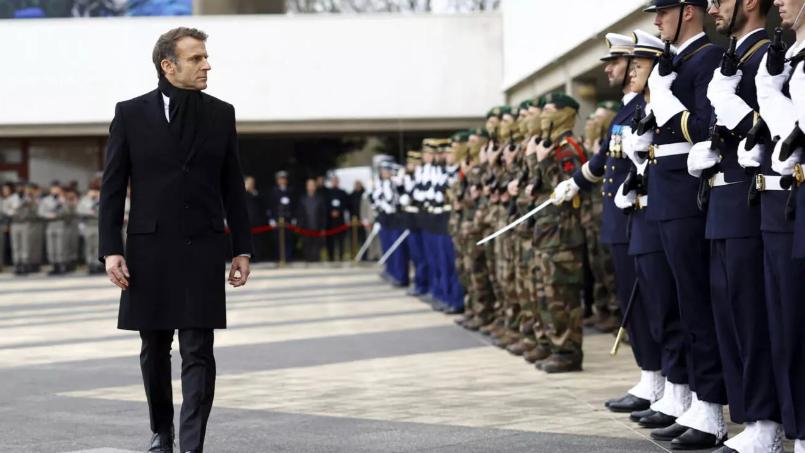
The sudden US decision to freeze military aid to Ukraine has put more pressure on Ukraine's European allies to fill the gap. It has also made France more urgent to call on Europe to strengthen its self-sufficient defense capabilities. When French President Emmanuel Macron first mentioned that France would shift to a "war economy" a few months after the outbreak of the Russian-Ukrainian war, it sparked widespread doubts.
First, France, as the only nuclear power in the European Union, still does not spend 2% of its GDP on defense, which is lower than the target set by NATO a decade ago. Moreover, France's arms aid to Ukraine is relatively small, which exposes the insufficiency of France's own arms reserves. Now, with the change in US policy, the French discussion on the "war economy" has once again become the focus, further arousing doubts about the US commitment to NATO and European defense.
Second, after the end of the Cold War, France, like other European democracies, drastically cut its defense spending, reduced the size of its army, and shifted resources to address problems such as high unemployment and weak economic growth at home. Although France's defense spending has finally broken the 2% threshold, it is still far behind the 5.4% defense spending in 1960 and the 2.8% after the collapse of the Soviet Union. Although France's military enterprises are world leaders, the industry employs only about 200,000 people.
In addition, American critics have long accused European allies of relying on the United States for defense spending while enjoying the nuclear umbrella and tens of thousands of troops provided by the United States. U.S. Secretary of State Marco Rubio pointed out last week that France and Germany are "economic powers" that rely on the United States for security and are therefore able to invest in a large social safety net. The remarks triggered a strong reaction from the French Foreign Ministry, which emphasized the "combat capability" of its own army and its ability to conduct large-scale operations overseas. The French Ministry of Defense said that France's defense spending targets are in line with NATO requirements and it is expected to double its defense budget by 2030.
However, French President Macron admitted after attending an emergency summit in Ukraine that the French government must review and increase its current seven-year military spending plan in view of the change in U.S. priorities. Macron called on European countries to increase defense spending to more than 3% of gross domestic product (GDP), a ratio previously proposed mainly by the Baltic countries, which have long been concerned about the threat from Russia. At the same time, European Union President Ursula von der Leyen also proposed plans to strengthen Europe's defense industry and military capabilities. Just after Trump froze aid to Ukraine, von der Leyen introduced the "Rearming Europe" plan, which is expected to raise nearly 800 billion euros for European defense while providing "immediate" military support to Ukraine.
Finally, France is under pressure to spend on defense, especially in the face of opposition from far-right and far-left opposition parties, which include nationalist and pacifist voices who believe that France should not ally with the United States. The far-right National Rally party has always been sympathetic to Russia and supports France's rearmament, but only in France's interests. The moderate Socialist opposition firmly supports Ukraine and hopes to coordinate with EU partners to increase military spending, but the premise is that France's social security system is not affected.
In summary, against the backdrop of the increasingly severe global security situation, France and other European countries are increasingly calling for strengthening their own defense capabilities, especially as the United States gradually withdraws its support for Ukraine. France's transformation into a "wartime economy" is not only a response to domestic and international pressures, but also a profound reflection on Europe's defense independence. Macron has shown France's determination to strengthen its military strength, but it also faces many challenges, especially how to balance the contradiction between military spending and the domestic social security system. At the same time, if Europe wants to achieve defense autonomy, it must reduce its dependence on American technology and arms and strengthen regional coordination and cooperation. The challenge in the future lies not only in the allocation of funds, but also in how to enhance Europe's strategic autonomy and overall defense capabilities through effective policies and cooperation.

報告顯示,中國電力投資加速增長,預計2024年電網基建投資將超過5300億元。
近日,市場迎來了一則引人注目的消息:工業巨頭3M公司(MMM.N)在本周五公布了其季度業績報告,隨後股價飆升至近兩年來的
最近,外媒給OpenAI算了筆賬,今年可能要血虧50億美元。
近日,巴黎奧運會和世界鐵人三項協會聯合發布了一項重大決定,宣布因塞納河水質污染問題,原定於近期進行的奧運會鐵人三項首次下
當地時間7月18日,法國巴黎發生了一起令人震驚的持刀襲警事件。
近期,一則重大消息在國際舞臺上引起軒然大波,馬來西亞宣布加入金磚國家。
調查發現,互聯網和智能手機的使用幹擾了韓國近五分之一學生的生活。